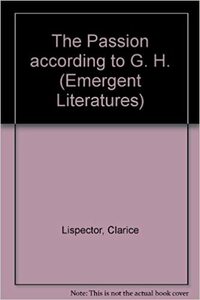You need to sign in or sign up before continuing.
Take a photo of a barcode or cover
entirely beautiful and hypnotising! I do not believe that my soul is fully formed unfortunately - I do think this would be fun to revisit often, such wonderful thought patterns and different conclusions.
I did not enjoy this book. On the one hand, I think that's a reflection of the amount of time and attention I put into reading it. "The Passion According to G.H." is an incredibly opaque, largely plot-less, rambling text. Approaching it like a textbook, or a critical essay, may yield insight and understanding; approaching it as a novel--even a novel read with deliberation and (some) patience--doesn't yield much. I tried, at times, to read it as the former, but even then it's a slog--interesting thoughts appear in one paragraph, only to be moved beyond in the next one (and well outside of sight in subsequent paragraphs). I'm sure there's an audience for this book; and, for that audience, this book may be meaningful. I was not that audience.
For further context on my experience with this novel. I read in article some months ago that described it as surreal, and its author as the best of 20th century Brazilian novelists. Knowing nothing more than that, I took the book out from the DC library in November, promptly read 30 pages and then put it down. Fast forward four months, and I need a second novel to take with me on vacation. Remarkably (and perhaps tellingly), no one from the DC library has requested the book, so I still have it; and the edition of "The Passion According to G.H." in my possession is paperback and light. I didn't particularly enjoy the first 30 pages, but how bad could the novel be? And what better circumstances to really focus on the text than vacation? True enough, a week into the vacation, faced with nothing else to read, I picked the book back up from the beginning. I can't think of another book that I've been more ready to DNF, but persevered through due to circumstances (here, no other book to read).
My complaints aside, there seem to be some interesting thoughts in the novel, and some good weird quotes. I somewhat regret not wrestling with the book, and its ideas, more.
"The time to lives is so hellishly inexpressive that it is the nothing. What I was calling 'nothing' was nevertheless so stuck to met that to me it was . . . I? and that's why it was becoming invisible as I was invisible to myself, and it was becoming nothing. The doors as always kept opening. Finally, my love, I gave in. And it became a now." 76.
What does that mean? Why is Lispector always asking questions, in the middle of thoughts? Is this surreal inanity disguised as thoughtful depth? I kind of hate it, but the total opacity somehow is thought-provoking and, in brief episodes, engaging.
For further context on my experience with this novel. I read in article some months ago that described it as surreal, and its author as the best of 20th century Brazilian novelists. Knowing nothing more than that, I took the book out from the DC library in November, promptly read 30 pages and then put it down. Fast forward four months, and I need a second novel to take with me on vacation. Remarkably (and perhaps tellingly), no one from the DC library has requested the book, so I still have it; and the edition of "The Passion According to G.H." in my possession is paperback and light. I didn't particularly enjoy the first 30 pages, but how bad could the novel be? And what better circumstances to really focus on the text than vacation? True enough, a week into the vacation, faced with nothing else to read, I picked the book back up from the beginning. I can't think of another book that I've been more ready to DNF, but persevered through due to circumstances (here, no other book to read).
My complaints aside, there seem to be some interesting thoughts in the novel, and some good weird quotes. I somewhat regret not wrestling with the book, and its ideas, more.
"The time to lives is so hellishly inexpressive that it is the nothing. What I was calling 'nothing' was nevertheless so stuck to met that to me it was . . . I? and that's why it was becoming invisible as I was invisible to myself, and it was becoming nothing. The doors as always kept opening. Finally, my love, I gave in. And it became a now." 76.
What does that mean? Why is Lispector always asking questions, in the middle of thoughts? Is this surreal inanity disguised as thoughtful depth? I kind of hate it, but the total opacity somehow is thought-provoking and, in brief episodes, engaging.
challenging
reflective
tense
slow-paced
Plot or Character Driven:
Character
Strong character development:
Complicated
Loveable characters:
Yes
Diverse cast of characters:
No
Flaws of characters a main focus:
Yes
Just incredible. Read it. I can't really put into words how good this is. Lispector is a criminally unrecognised genius.
Quite the command performance, writing 200 pages about a simple act that would probably be a paragraph or a page described in another book. The synopsis is spot on: A woman traps a roach in a door being closed and proceeds to barrel into her personhood, riding the feeling of what she’s doing to another creature, as well as the thoughts provoked by the feelings. Drilling down and down until it becomes about the human condition and tempers her identity.
It was certainly an overwhelming experience sometimes. Operating on the symbolic level predominantly and concrete made it hypnotic, mesmeric to read, but also stuffed full as the character herself was inundated with thoughts and feelings about life and herself. I really like that what galvanized this internalization was the asserting of her humanity on another living creature. One that is far more equipped for life, in some ways, than humanity. It’s ancient and therefor provokes ancient thoughts when ruminated upon.
Stylistically, it feels and looked like an art house horror movie to me. Shifting and atmospheric. Circuitous and repetitious to effectively recreate the wrestling occurring internally. I think it’s a bit too obtuse for me, but on an additional reading would probably open it up further to me, possibly.
It was certainly an overwhelming experience sometimes. Operating on the symbolic level predominantly and concrete made it hypnotic, mesmeric to read, but also stuffed full as the character herself was inundated with thoughts and feelings about life and herself. I really like that what galvanized this internalization was the asserting of her humanity on another living creature. One that is far more equipped for life, in some ways, than humanity. It’s ancient and therefor provokes ancient thoughts when ruminated upon.
Stylistically, it feels and looked like an art house horror movie to me. Shifting and atmospheric. Circuitous and repetitious to effectively recreate the wrestling occurring internally. I think it’s a bit too obtuse for me, but on an additional reading would probably open it up further to me, possibly.
adventurous
challenging
dark
emotional
mysterious
reflective
tense
slow-paced
Plot or Character Driven:
Character
Strong character development:
Yes
challenging
reflective
slow-paced
Plot or Character Driven:
Character
Strong character development:
Yes
challenging
reflective
slow-paced
A wealthy Brazilian sculptress faces off with a cockroach and experiences something between a mental breakdown and revelation about the whole human race over 200 pages.
Serious literary genius right here. I could read this a dozen times and never have the same conclusion. You’re rarely on sure footing with Lispector’s style, yet you’re compelled forward, inhaling paragraph after paragraph. Some part of you understands what’s she’s after, even if your brain hasn’t caught up yet. It makes me think of a great line from The Assassination of Jesse James film.
“I ain’t even know what a star is exactly.”
“Well, your body knows. It’s your mind that forgot.”
Serious literary genius right here. I could read this a dozen times and never have the same conclusion. You’re rarely on sure footing with Lispector’s style, yet you’re compelled forward, inhaling paragraph after paragraph. Some part of you understands what’s she’s after, even if your brain hasn’t caught up yet. It makes me think of a great line from The Assassination of Jesse James film.
“I ain’t even know what a star is exactly.”
“Well, your body knows. It’s your mind that forgot.”



